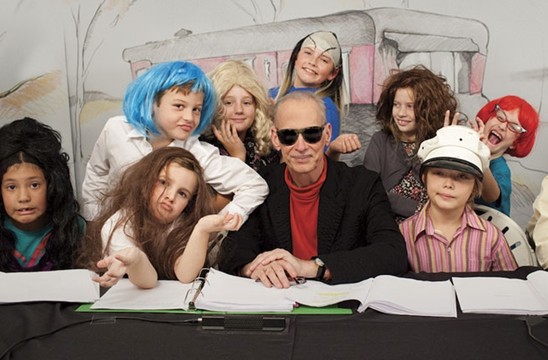
Now in its fifth year, Scalarama is an annual celebration of film, aiming to make September the unofficial month of cinema. Like the Edinburgh Fringe, Scalarama doesn’t directly programme or provide venues. Instead, they help boost existing cinemas, set up training to help new cinema clubs get started and advocates for some of the finest cult films from around the world. We spoke to Michael Pierce (a former participant in our Cultural Cinema Exhibition course!) about what people could expect from this year’s event and how you can get involved. If you’d like to participate in this year’s season, visit their website and submit your event. Submissions are open up to and throughout September, but if you do it before this Friday 17th July, it will be feature in the nationally distributed Scalarama newspaper.
What is Scalarama?
The idea is that anyone can put on a film as part of Scalarama, whether you are a cinema, film club, festival or completely new to showing films. It’s a time for all those who care deeply about cinema to unite, a sign of solidarity and an exchange of ideas, and to create excitement and adventure around cinema programming and cinema attending. Scalarama is now inits fifth year and has seen over 400 different exhibitors across the UK all put on an event over the years, and the hope is that eventually every cinema, film society and passionate enthusiast around the world will join in the celebration each year.

What were the big hits from last years celebrations?
People can choose whatever films they want, there are no restrictions. But where Scalarama really works is when exhibitors team up to get more of a collective buy in from distributors, who have been happy to offer discounts on back catalogue titles. Also with backing from the BFI, Scalarama has been able to improve access to archive titles that might be prohibitively expensive and for the last three years has created a core programme of titles that exhibitors can book. To show the range of titles, last year Scalarama worked with Park Circus to reproduce ‘Odorama’ – the scratch’n’sniff cards from John Waters’ 1981 comedy Polyester. The season also brought over Bla Tarr’s seven hour film Satantango on 35mm from Hungary – all 26 reels of it!
What are you especially looking forward to this year?
This year, Scalarama has moved away from the core selection towards highlighting themes, reacting to trends over the last five years, which will continue into the future. These include Project 51, a larger initiative to discuss representation on screen, focusing this year on female filmmakers and characters, and involving many programmers around the country who highlight this issue. This is also part of on an international event called #DirectedbyWomen from 1-15 September. Scalarama 2015 themes also include Celluloid Forever and VHStival, talking about the need to preserve and celebrate tactile formats in an increasingly digitised and streamable film world. Personally, I’m also extremely excited that the Radical Film Network, a large group of organisations who screen political and experimental films, are collaborating on an event where the same films will be shown on the same day across the UK with a focus on direct action, which is what Scalarama is all about!

Why the Scala cinema?
The Scala was a repertory cinema in London, first off Goodge Street and then moving to King’s Cross, that closed in 1993 and it’s the fact that people still talk about it and are influenced by it that it formed the strong basis for our first tribute season in 2011. Called Scala Forever, the season brought together the cinema’s programmers, audience members and those who had never been to the Scala, to all talk about the legend of cinemas and how to create a legacy for future generations. The Scala wasn’t alone in showing old films and double bills, but its style, its swagger and its cats ensured that it was keenly attended, dearly loved and fondly missed. And the fact that you can pick up any old Scala flyer, and want to see all of the films on it, shows how the past is always a source of inspiration. The Scalarama seasons have moved beyond the Scala to talk about film culture now, but we are honoured to continue to have a link back to a cinema that brought so many different groups together under its roof.
Which cinemas or film clubs have really impressed you over the last few years working at Scalarama?
Choosing specific cinemas or film clubs to highlight is extremely hard as the personal delight I’ve received over the years is to find out about and meet the individuals behind the programming, and to see past the film choice, to the intentions behind them. I’ve been inspired by those who have always seen beyond their film initiatives, to what film programming means for the community and wanting to create safe spaces to explore wild, wonderful, weird or essential ideas about the world. I’m not sure impressed is the right word, but I’m really excited that this year exhibitors in key cities have been working together since May to share ideas, support each other and co-ordinate their activity in a way we’ve dreamed of since the beginning. Hopefully this will inspire others to work together with like-minded organisations wherever they are next year.

What film experience do you wish would come back, and which film experience do you wish would die out?
I guess this ties into moving away from just thinking about the cinema as the film itself, box office and the business side, and talking a lot more about the whole journey from a filmmaker’s idea all the way to a film’s posterity, about how film connects people (both in making and screening)and that the cinema experience itself can be a performance, a meditation, a seance, a town hall meeting and the fire we gather around to tell stories about ourselves. This will never die out, but it’s time to stop talking about ‘film people’ as a subset, and start realising that some of the ways cinema is talked about, can intimidate people or put people off. It’s time for cinemas to have open arms, to address barriers to entry (whether it’s ticket prices,physical barriers or lack of diverse programming), choose collaboration over competition and aim for the bigger ideals of what cinema can be.

What are your tips for someone who hasn’t set up a screening before but is keen to?
First of all… DO IT. If you ever have the inkling to want to watch a film on the big screen, follow that feeling through. There is always a way to make it happen. Start a regular film club in your or a friend’s home,and work up from there. Second… CONNECT – find the people who are already screening locally or use the internet (or Scalarama) to connect with people who have a programming style that you admire. But also connect with your friends, colleagues, neighbours, family… strangers and talk about cinema. This will help you find ideas, support and spaces to screen in. Third – RESEARCH. This is a golden time for DIY cinema with the BFI supporting it like never before, and organisations like ICO and Cinema For All being huge resources for those starting out. But also research films and find out what hasn’t been shown and why. And lastly, THINK. Think about why you want to share these films and what will satisfy you – pare your desires down to the root and you will find it easier to connect with people who share those impulses. Putting on a show should be fun, but it’s also a great act in bringing people together. It’s so important in these days when bigger things can divide us, that we can gather and share and talk about dreams and ideas. This is what film can do, and long may the land be filled with cinemas.

